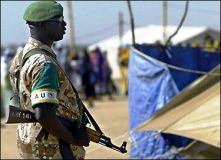African force creating pockets of security in Darfur, aid official says
By RODRIQUE NGOWI, Associated Press Writer
NAIROBI, Kenya, Mar 11, 2005 (AP) — A tiny African peacekeeping force is creating pockets of security in Sudan’s western Darfur region — successfully heading off attacks on civilians, negotiating the release of hostages and providing safety for some villagers to return to their homes, officials said Friday.

|
|
A Rwandan soldier belonging to the African Union Force patrols in El-Fasher, Sudan. (AFP) . |
The limited success of the 2,200-strong force shows that a bigger force with more support from the international community could stabilize the region, said Kenneth Bacon, a former Pentagon spokesman who now heads the advocacy group Refugees International.
The African Union is waiting for donors to provide the support they promised Africa in its efforts to send the rest of its 3,320-strong peacekeeping force to Darfur, said AU spokesman Assane Ba.
“Getting the troops is not a problem. But you can’t deploy troops where they can’t have tents to live in, food or logistical communications,” Ba said. “The problem is support from the international community.”
Still, the tiny force that is already on the ground is making a difference in Darfur, where a campaign of violence by pro-government militia fighting rebels has forced an estimated 2 million people to flee their homes.
On Feb. 22, an AU commander negotiated the release of seven aid workers from the Catholic Relief Services who were abducted a day earlier by rebels. Earlier, peacekeepers secured the release of a group of Sudanese soldiers captured by the same group, Bacon said in a statement.
In January, another AU commander foiled an attack on Labado, a town of 27,000 people, by deploying 100 peacekeepers to the area and a nearby town. He was acting on information that pro-government forces planned to raid the town that was leveled in late December in a bid to drive out rebels.
The African Union Mission in Sudan, or AMIS, “is doing a spectacular job in the areas in which it has deployed. The best example is Labado, where it has stationed about 100 troops since January. More than 10,000 people have returned to the area because AMIS forces are providing a sense of security,” Bacon said.
Pockets of security in Darfur are expected to expand as members of AU’s 815-strong civil police force continue to arrive and begin to patrol in and around the camps that are housing people who fled their homes, Bacon said.
“Patrols on the perimeter of the camps should cut the number of rapes and other attacks against women leaving the camps to collect firewood and grass,” Bacon said.
The AU force, however, needs to expand to at least 10,000 troops to fully stabilize Darfur, Bacon said.
The U.N. Department of Peacekeeping Operations is currently assessing the AU mission to determine its current and future needs. The assessment, which should be finished before the end of the month, will help the AU, donor nations and the UN determine what should be done next to stabilize and secure Darfur, Bacon said.
“As long as our hands and legs are tied by a lack of resources to finance peacekeeping operations, Africa cannot move forward to solve the crisis in Darfur,” said AU spokesman Desmond Orjiako. “We have received help, but what we are now saying is they (donors) should move faster.”
